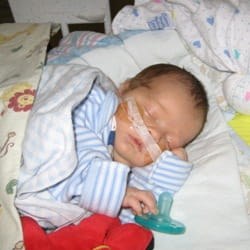Surgery fixes Nicholas’ Intestinal Defect
Nicholas' Story
Anne and Matt were delighted when they learned Anne was pregnant with their second child, Nicholas. But an ultrasound when Anne was at 32 weeks revealed something was wrong: Their unborn son had a blockage in his intestines. Nicholas would require surgery the day after he was born to survive.
Anne’s pregnancy was carefully monitored with frequent ultrasounds to keep a close watch on Nicholas’ condition, jejunoileal atresia. The family was referred to the Cincinnati Fetal Care Center at Cincinnati Children’s Hospital Medical Center, a partnership of the area’s top hospitals that provides comprehensive health services for high-risk pregnancy patients. The worried parents were put at ease by the specialists who met with them to discuss their son's care.
“We couldn’t have asked for a more understanding team of professionals at Cincinnati Children’s,” says Anne. “They took care of the whole package – every need, medical and emotional. We had a thousand questions, and they explained everything to us, so we knew exactly what to expect each step of the way.”
Surgery for Nicholas
An hour after Nicholas was born on October 29, he was taken to Cincinnati Children’s to be prepared for next-day surgery. Matt rode in the Pediatric Transport Team’s ambulance with his little son while Anne stayed behind in the birth hospital to recover from her C-section.
“That was hard – I’m in the hospital by myself, and my baby is waiting for surgery down the street,” says Anne.
During the two-hour procedure, the expert surgeons removed the obstruction, which had been caused by the intestines twisting early in Nicholas’s fetal development.
“These types of atresias generally occur because the blood supply to a piece of intestine doesn’t develop correctly or becomes blocked during fetal development,” says Richard Falcone, MD, MPH, who led the surgery. “So the intestine comes to a dead end – it’s not connected to the rest of the intestines. When babies with this condition feed, the food comes to a stop at the obstruction and then comes back up. They’ll just keep throwing up – they can’t survive if they can’t eat.”
Once the obstruction was removed, Nicholas’s surgeons reconnected the two ends that had been separated so that the intestine was whole again. They also tapered a foot-long section that preceded the obstruction, because the blockage had stretched that portion of the intestine much wider than it should be.
“We had to narrow that part because the bowel works by squeezing,” Dr. Falcone says. “If the intestine is too wide, it can’t grip the food and move it along to go through the digestive process.”
While Anne continued her recuperation from the birth, Matt spent the next three nights at Cincinnati Children’s sleeping in the hospital’s room for families near Nicholas’s crib in the Regional Center for Newborn Intensive Care (RCNIC). The RCNIC at Cincinnati Children’s is a level III neonatal intensive care unit that provides the highest level of medical care to premature and critically ill newborns from throughout Greater Cincinnati.
Nicholas was born with blocked intestines and was immediately transferred to Cincinnati Children's for care by the top gastroenterology team in the nation.
“I didn’t want to leave Nicholas alone there,” Matt remembers. “But, after I saw the excellent care he was getting, I felt comfortable enough to finally go home at night. I felt like we were getting extra special care. After those three days, I completely trusted everyone.”
Nicholas spent the first four weeks of his life in the RCNIC, being cared for by a dedicated team of doctors and nurses. As soon as Anne was able, she joined Matt in the RCNIC to hold their new little son and bond with him.
Nicholas was fed nutrients through a tube until his bowels were working properly. When his doctors thought he was ready, Nicholas was given breast milk by mouth. After a slow start, which is normal for infants after such major abdominal surgery, Nicholas was soon eating like a champ.
In fact, he did so well that he exceeded his doctors’ expectations. Anne says that they were first told that they might be able to take Nicholas home before Christmas, but he was actually well enough to come home by Thanksgiving. Now 10 months old, Nicholas has been thriving ever since.
“He’s just a normal, healthy little guy,” Anne says. “He’s curious, happy and healthy. He’s having no trouble keeping up with his big brother – he’s a mover and shaker.”
Dr. Falcone, who recently saw Nicholas for his 10-month post-surgery checkup, is pleased with how far Nicholas has come. “Nicholas is doing great. He has no digestive issues and should continue to do well,” says Dr. Falcone.
Anne says that she feels lucky that Cincinnati Children’s was there for Nicholas and the entire family. “Everyone we met at Cincinnati Children’s has been so caring and professional,” Anne says. “They really put you and your child first and foremost.”
When Nicholas was just 2 days old, the world-class surgeons at Cincinnati Children's repaired his intestines. After just four weeks, Nicholas was well enough to go home with his family.
Share Your Story
If you have an experience with Cincinnati Children's, we invite you to share your story.








